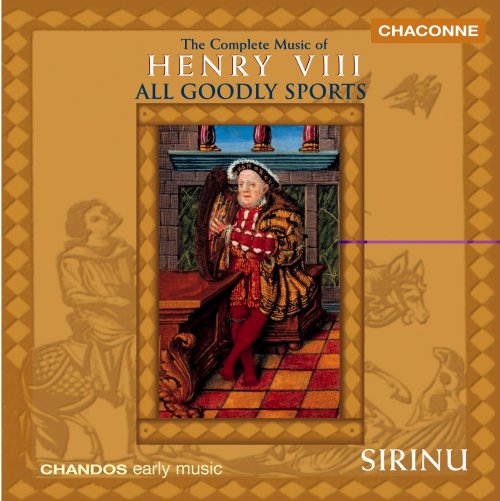
Sirinu - All Goodly Sports: Music of Henry VIII (1998)
BAND/ARTIST: Sirinu
- Title: All Goodly Sports: Music of Henry VIII
- Year Of Release: 1998
- Label: Chandos Records
- Genre: Classical
- Quality: FLAC (image + .cue, log, booklet)
- Total Time: 01:05:58
- Total Size: 273 MB
- WebSite: Album Preview
Tracklist:
The Complete Music of Henry VIII (1491–1547)
[1] 'Wherto shuld I expresse'
[2] Consort XXIII
[3] 'Thow that men do call it dotage'
[4] 'Grene growith the holy'
[5] Consort V
[6] 'Wythowt dyscord'
[7] Consort II
[8] 'Helas madam'
[9] Consort XII
[10] 'Alas, alac, what shall I do'
[11] Consort XIV
[12] 'Pastyme with good companye'
[13] 'The tyme of youthe'
[14] Consort IV
[15] 'Departure is my chef payne'
[16] Consort XVI
[17] 'Lusti yough shuld us ensue'
[18] En vray amoure
[19] 'Whoso that wyll for grace sew'
[20] Consort XIII
[21] 'Adew madam et ma mastres'
[22] Tandernaken
[23] 'Alas, what shall I do for love?'
[24] Consort VIII
[25] 'It is to me a ryght gret joy'
[26] Consort XV
[27] 'O my hart'
[28] 'Whoso that wyll all feattes optayne'
[29] Gentil prince de renom
[30] 'Though sum saith that yough rulyth me'
[31] Consort III
[32] 'If love now reynyd' (version 1)
[33] 'If love now reynyd' (version 2)
[34] Consort XXII
The Complete Music of Henry VIII (1491–1547)
[1] 'Wherto shuld I expresse'
[2] Consort XXIII
[3] 'Thow that men do call it dotage'
[4] 'Grene growith the holy'
[5] Consort V
[6] 'Wythowt dyscord'
[7] Consort II
[8] 'Helas madam'
[9] Consort XII
[10] 'Alas, alac, what shall I do'
[11] Consort XIV
[12] 'Pastyme with good companye'
[13] 'The tyme of youthe'
[14] Consort IV
[15] 'Departure is my chef payne'
[16] Consort XVI
[17] 'Lusti yough shuld us ensue'
[18] En vray amoure
[19] 'Whoso that wyll for grace sew'
[20] Consort XIII
[21] 'Adew madam et ma mastres'
[22] Tandernaken
[23] 'Alas, what shall I do for love?'
[24] Consort VIII
[25] 'It is to me a ryght gret joy'
[26] Consort XV
[27] 'O my hart'
[28] 'Whoso that wyll all feattes optayne'
[29] Gentil prince de renom
[30] 'Though sum saith that yough rulyth me'
[31] Consort III
[32] 'If love now reynyd' (version 1)
[33] 'If love now reynyd' (version 2)
[34] Consort XXII
By all accounts, Henry VIII was a talented and respected musician. His enthusiasm for collecting music and musicians never waned during his life, though his activities as a composer and performer were strongest as a young man in his twenties and thirties. His achievements as a composer have been exaggerated by his subjects and posterity, but he left more compositions than any other monarch.
During his lifetime Henry continually enlarged the royal musical household and its stock of instruments, which was spread around royal palaces; the type and style of the instruments used on this recording reflect Henry’s collection.
In the Henry III Manuscript, a compilation of the music which reflects that used in Henry’s Court, thirty-four compositions are attributed to the King, encompassing an impressive variety of song and instrumental styles. Only one of these pieced - ’Passtyme with good cumpanye’ - appears in another source. The same song is also included twice in the Henry VIII MS, but in two slighty differing versions. many of the pieces are brief, and probably served as preludes to more substantial songs, a proceedure that has been followed on this recording. His instrumental pieces rank among the very earliest English part music for instruments alone and they reflect the heightened status of the new-style household musicians who could read music.
Henry’s instrumental pieces are performed here in a variety of combinations representative of the Royal collection of instruments - the ’alta’ bands of shawms and sackbuts; a consort of three early renaissance viols, consorts of recorders, plucked strings and mixed groups. The vocal pieces are performed in a variety of styles; some with old-style minstrel accompaniments, or with a solo voice and instruments substituting the lower parts. Others are performed as partsongs, particularly those of great difficulty that were probably written for the professional singers of the Chapel Royal.
During his lifetime Henry continually enlarged the royal musical household and its stock of instruments, which was spread around royal palaces; the type and style of the instruments used on this recording reflect Henry’s collection.
In the Henry III Manuscript, a compilation of the music which reflects that used in Henry’s Court, thirty-four compositions are attributed to the King, encompassing an impressive variety of song and instrumental styles. Only one of these pieced - ’Passtyme with good cumpanye’ - appears in another source. The same song is also included twice in the Henry VIII MS, but in two slighty differing versions. many of the pieces are brief, and probably served as preludes to more substantial songs, a proceedure that has been followed on this recording. His instrumental pieces rank among the very earliest English part music for instruments alone and they reflect the heightened status of the new-style household musicians who could read music.
Henry’s instrumental pieces are performed here in a variety of combinations representative of the Royal collection of instruments - the ’alta’ bands of shawms and sackbuts; a consort of three early renaissance viols, consorts of recorders, plucked strings and mixed groups. The vocal pieces are performed in a variety of styles; some with old-style minstrel accompaniments, or with a solo voice and instruments substituting the lower parts. Others are performed as partsongs, particularly those of great difficulty that were probably written for the professional singers of the Chapel Royal.
Classical | FLAC / APE | CD-Rip
As a ISRA.CLOUD's PREMIUM member you will have the following benefits:
- Unlimited high speed downloads
- Download directly without waiting time
- Unlimited parallel downloads
- Support for download accelerators
- No advertising
- Resume broken downloads


